CPPDSM4007A - Legal and Ethical Requirements of Property Management
VerifiedAdded on 2021/06/15
|19
|4763
|79
Homework Assignment
AI Summary
This assignment assesses a student's understanding of the legal and ethical requirements of property management, focusing on the unit CPPDSM4007A. The assessment covers essential topics such as effective communication skills in property management, the main legislation governing residential tenancies in New South Wales, and the relevant statutory authorities. It also explores ethical and conduct standards, dispute resolution processes, and the procedures for handling rental bonds, including the maximum amounts, legislative restrictions, and timeframes. Additionally, the assignment examines the differences between fixed-term and periodic tenancies, their impact on property sales, and the legislative requirements for providing notice and gaining access to show properties. The student provides detailed answers, referencing relevant state legislation and providing practical examples to demonstrate their knowledge of property management practices.
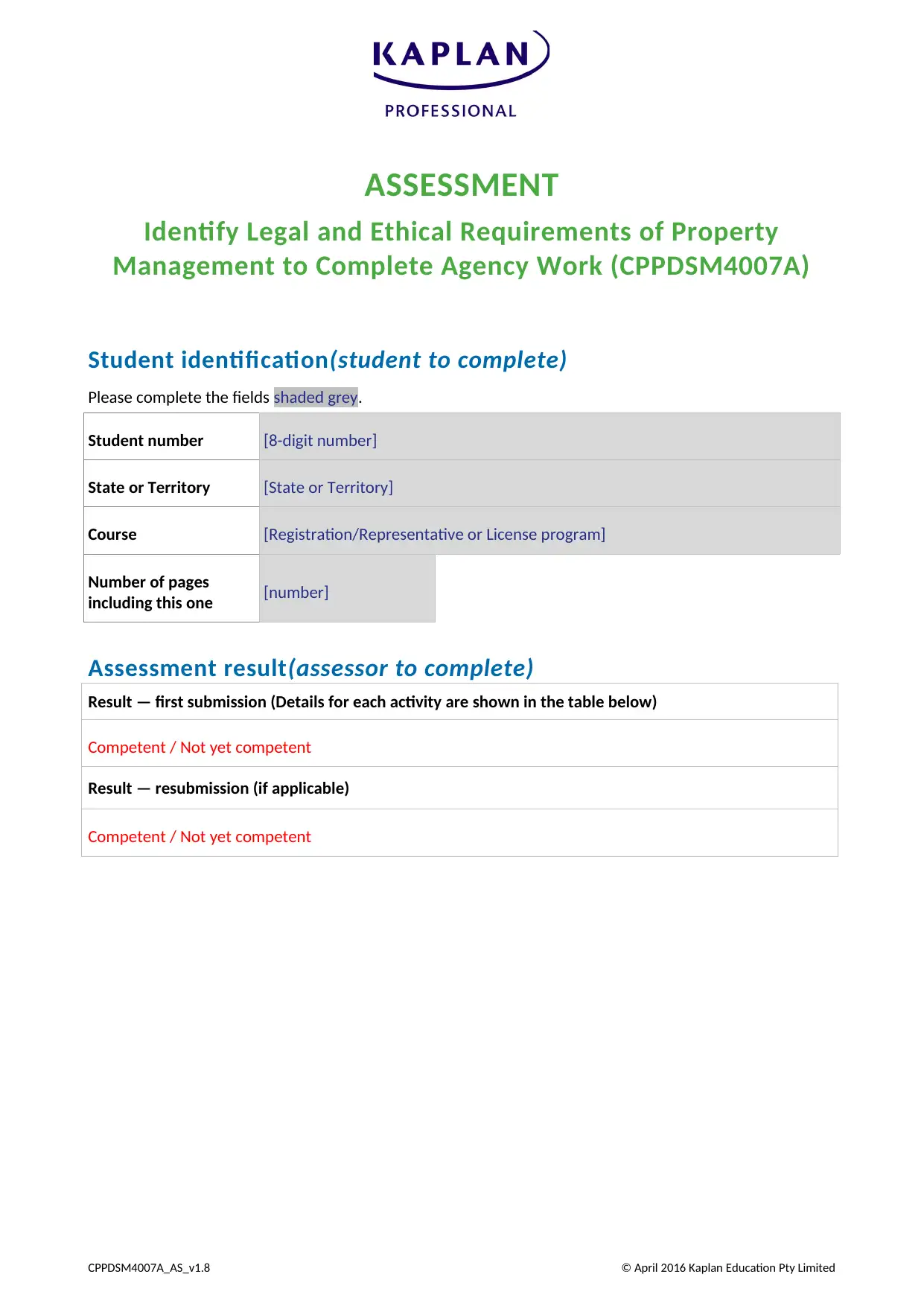
ASSESSMENT
Identify Legal and Ethical Requirements of Property
Management to Complete Agency Work (CPPDSM4007A)
Student identification(student to complete)
Please complete the fields shaded grey.
Student number [8-digit number]
State or Territory [State or Territory]
Course [Registration/Representative or License program]
Number of pages
including this one [number]
Assessment result(assessor to complete)
Result — first submission (Details for each activity are shown in the table below)
Competent / Not yet competent
Result — resubmission (if applicable)
Competent / Not yet competent
CPPDSM4007A_AS_v1.8 © April 2016 Kaplan Education Pty Limited
Identify Legal and Ethical Requirements of Property
Management to Complete Agency Work (CPPDSM4007A)
Student identification(student to complete)
Please complete the fields shaded grey.
Student number [8-digit number]
State or Territory [State or Territory]
Course [Registration/Representative or License program]
Number of pages
including this one [number]
Assessment result(assessor to complete)
Result — first submission (Details for each activity are shown in the table below)
Competent / Not yet competent
Result — resubmission (if applicable)
Competent / Not yet competent
CPPDSM4007A_AS_v1.8 © April 2016 Kaplan Education Pty Limited
Paraphrase This Document
Need a fresh take? Get an instant paraphrase of this document with our AI Paraphraser

Feedback (assessor to complete)
[insert assessor feedback]
CPPDSM4007A_AS_v1.9 Page 2 of 19
[insert assessor feedback]
CPPDSM4007A_AS_v1.9 Page 2 of 19
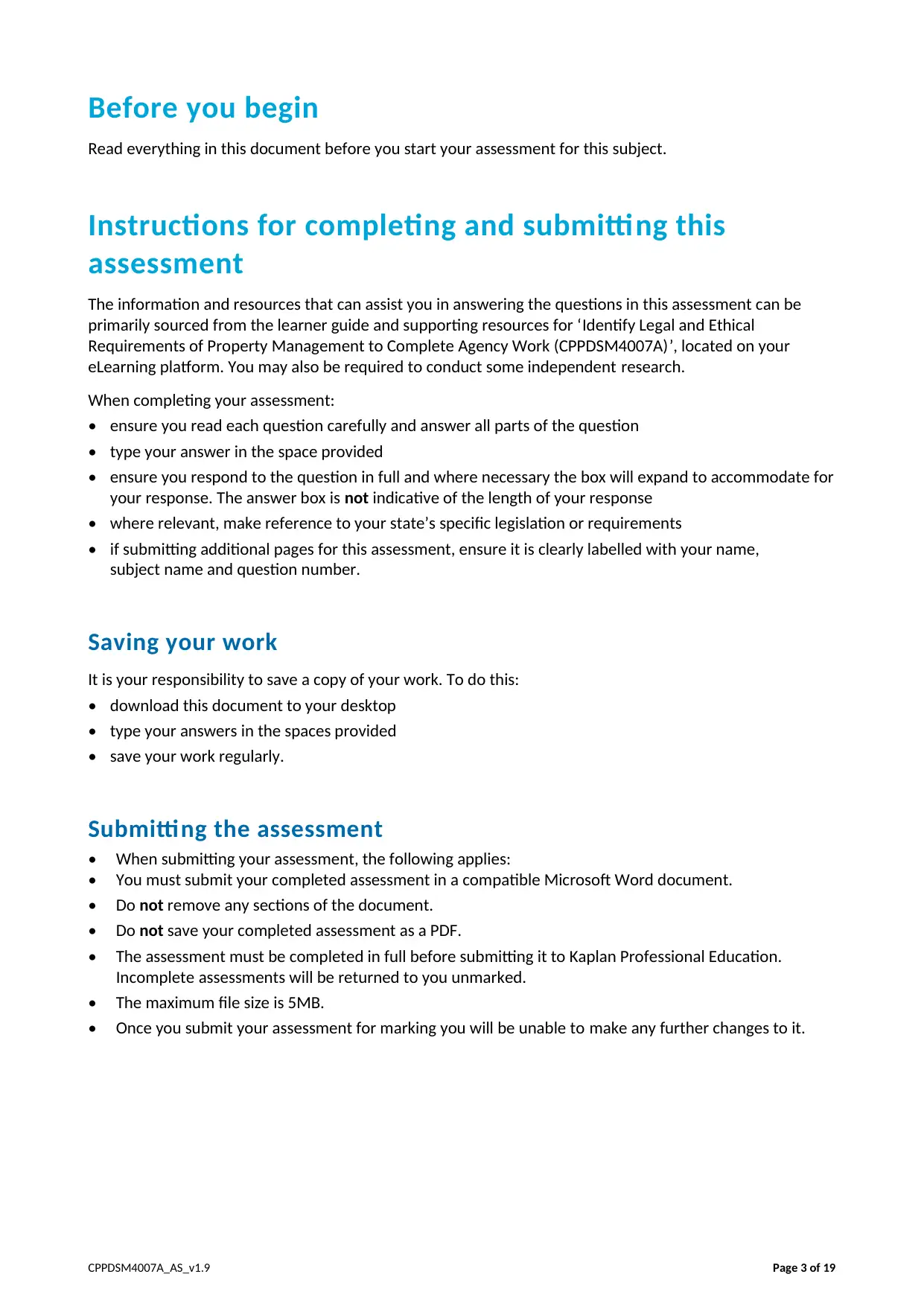
Before you begin
Read everything in this document before you start your assessment for this subject.
Instructions for completing and submitting this
assessment
The information and resources that can assist you in answering the questions in this assessment can be
primarily sourced from the learner guide and supporting resources for ‘Identify Legal and Ethical
Requirements of Property Management to Complete Agency Work (CPPDSM4007A)’, located on your
eLearning platform. You may also be required to conduct some independent research.
When completing your assessment:
• ensure you read each question carefully and answer all parts of the question
• type your answer in the space provided
• ensure you respond to the question in full and where necessary the box will expand to accommodate for
your response. The answer box is not indicative of the length of your response
• where relevant, make reference to your state’s specific legislation or requirements
• if submitting additional pages for this assessment, ensure it is clearly labelled with your name,
subject name and question number.
Saving your work
It is your responsibility to save a copy of your work. To do this:
• download this document to your desktop
• type your answers in the spaces provided
• save your work regularly.
Submitting the assessment
• When submitting your assessment, the following applies:
• You must submit your completed assessment in a compatible Microsoft Word document.
• Do not remove any sections of the document.
• Do not save your completed assessment as a PDF.
• The assessment must be completed in full before submitting it to Kaplan Professional Education.
Incomplete assessments will be returned to you unmarked.
• The maximum file size is 5MB.
• Once you submit your assessment for marking you will be unable to make any further changes to it.
CPPDSM4007A_AS_v1.9 Page 3 of 19
Read everything in this document before you start your assessment for this subject.
Instructions for completing and submitting this
assessment
The information and resources that can assist you in answering the questions in this assessment can be
primarily sourced from the learner guide and supporting resources for ‘Identify Legal and Ethical
Requirements of Property Management to Complete Agency Work (CPPDSM4007A)’, located on your
eLearning platform. You may also be required to conduct some independent research.
When completing your assessment:
• ensure you read each question carefully and answer all parts of the question
• type your answer in the space provided
• ensure you respond to the question in full and where necessary the box will expand to accommodate for
your response. The answer box is not indicative of the length of your response
• where relevant, make reference to your state’s specific legislation or requirements
• if submitting additional pages for this assessment, ensure it is clearly labelled with your name,
subject name and question number.
Saving your work
It is your responsibility to save a copy of your work. To do this:
• download this document to your desktop
• type your answers in the spaces provided
• save your work regularly.
Submitting the assessment
• When submitting your assessment, the following applies:
• You must submit your completed assessment in a compatible Microsoft Word document.
• Do not remove any sections of the document.
• Do not save your completed assessment as a PDF.
• The assessment must be completed in full before submitting it to Kaplan Professional Education.
Incomplete assessments will be returned to you unmarked.
• The maximum file size is 5MB.
• Once you submit your assessment for marking you will be unable to make any further changes to it.
CPPDSM4007A_AS_v1.9 Page 3 of 19
⊘ This is a preview!⊘
Do you want full access?
Subscribe today to unlock all pages.

Trusted by 1+ million students worldwide
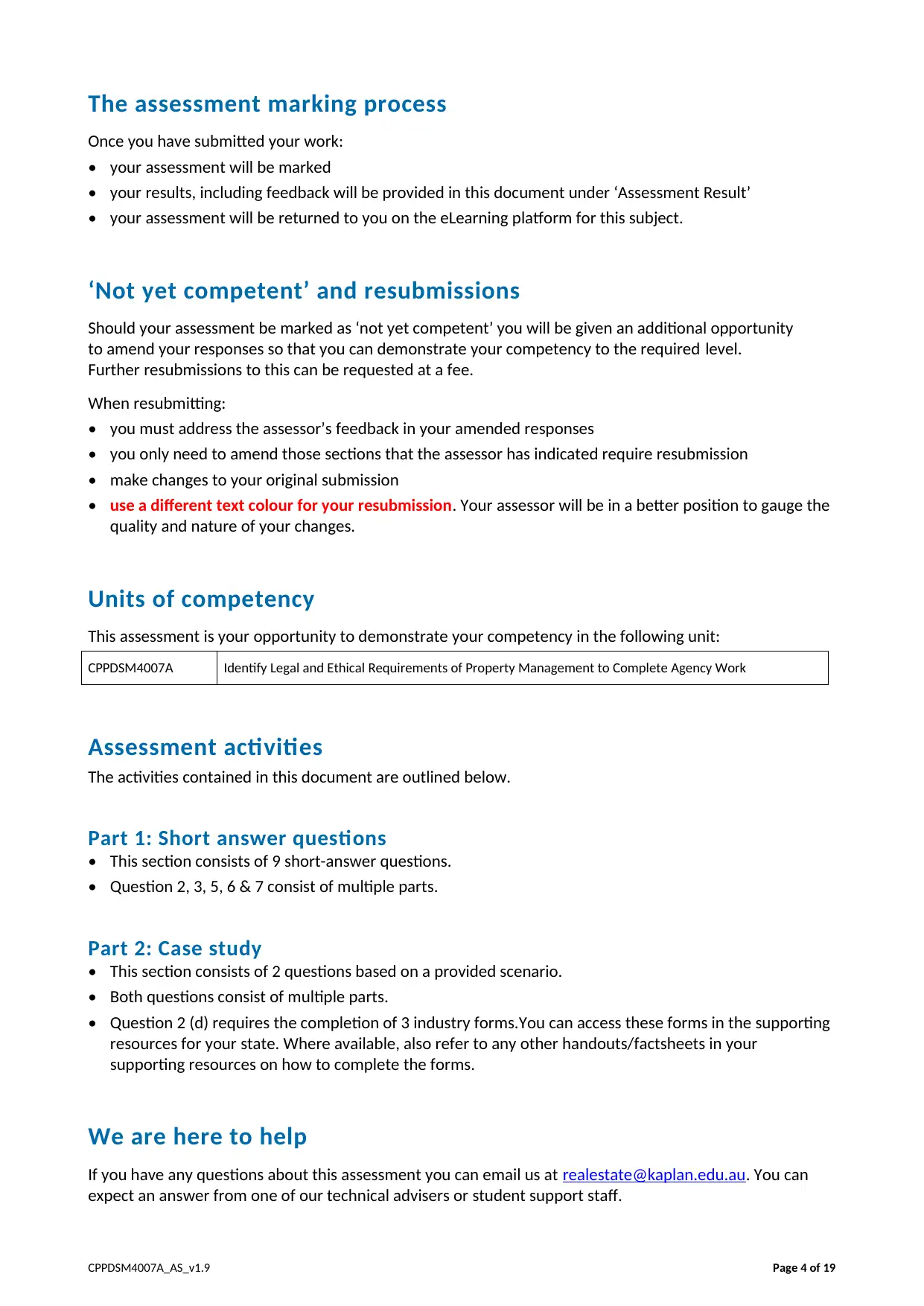
The assessment marking process
Once you have submitted your work:
• your assessment will be marked
• your results, including feedback will be provided in this document under ‘Assessment Result’
• your assessment will be returned to you on the eLearning platform for this subject.
‘Not yet competent’ and resubmissions
Should your assessment be marked as ‘not yet competent’ you will be given an additional opportunity
to amend your responses so that you can demonstrate your competency to the required level.
Further resubmissions to this can be requested at a fee.
When resubmitting:
• you must address the assessor’s feedback in your amended responses
• you only need to amend those sections that the assessor has indicated require resubmission
• make changes to your original submission
• use a different text colour for your resubmission. Your assessor will be in a better position to gauge the
quality and nature of your changes.
Units of competency
This assessment is your opportunity to demonstrate your competency in the following unit:
CPPDSM4007A Identify Legal and Ethical Requirements of Property Management to Complete Agency Work
Assessment activities
The activities contained in this document are outlined below.
Part 1: Short answer questions
• This section consists of 9 short-answer questions.
• Question 2, 3, 5, 6 & 7 consist of multiple parts.
Part 2: Case study
• This section consists of 2 questions based on a provided scenario.
• Both questions consist of multiple parts.
• Question 2 (d) requires the completion of 3 industry forms.You can access these forms in the supporting
resources for your state. Where available, also refer to any other handouts/factsheets in your
supporting resources on how to complete the forms.
We are here to help
If you have any questions about this assessment you can email us at realestate@kaplan.edu.au. You can
expect an answer from one of our technical advisers or student support staff.
CPPDSM4007A_AS_v1.9 Page 4 of 19
Once you have submitted your work:
• your assessment will be marked
• your results, including feedback will be provided in this document under ‘Assessment Result’
• your assessment will be returned to you on the eLearning platform for this subject.
‘Not yet competent’ and resubmissions
Should your assessment be marked as ‘not yet competent’ you will be given an additional opportunity
to amend your responses so that you can demonstrate your competency to the required level.
Further resubmissions to this can be requested at a fee.
When resubmitting:
• you must address the assessor’s feedback in your amended responses
• you only need to amend those sections that the assessor has indicated require resubmission
• make changes to your original submission
• use a different text colour for your resubmission. Your assessor will be in a better position to gauge the
quality and nature of your changes.
Units of competency
This assessment is your opportunity to demonstrate your competency in the following unit:
CPPDSM4007A Identify Legal and Ethical Requirements of Property Management to Complete Agency Work
Assessment activities
The activities contained in this document are outlined below.
Part 1: Short answer questions
• This section consists of 9 short-answer questions.
• Question 2, 3, 5, 6 & 7 consist of multiple parts.
Part 2: Case study
• This section consists of 2 questions based on a provided scenario.
• Both questions consist of multiple parts.
• Question 2 (d) requires the completion of 3 industry forms.You can access these forms in the supporting
resources for your state. Where available, also refer to any other handouts/factsheets in your
supporting resources on how to complete the forms.
We are here to help
If you have any questions about this assessment you can email us at realestate@kaplan.edu.au. You can
expect an answer from one of our technical advisers or student support staff.
CPPDSM4007A_AS_v1.9 Page 4 of 19
Paraphrase This Document
Need a fresh take? Get an instant paraphrase of this document with our AI Paraphraser
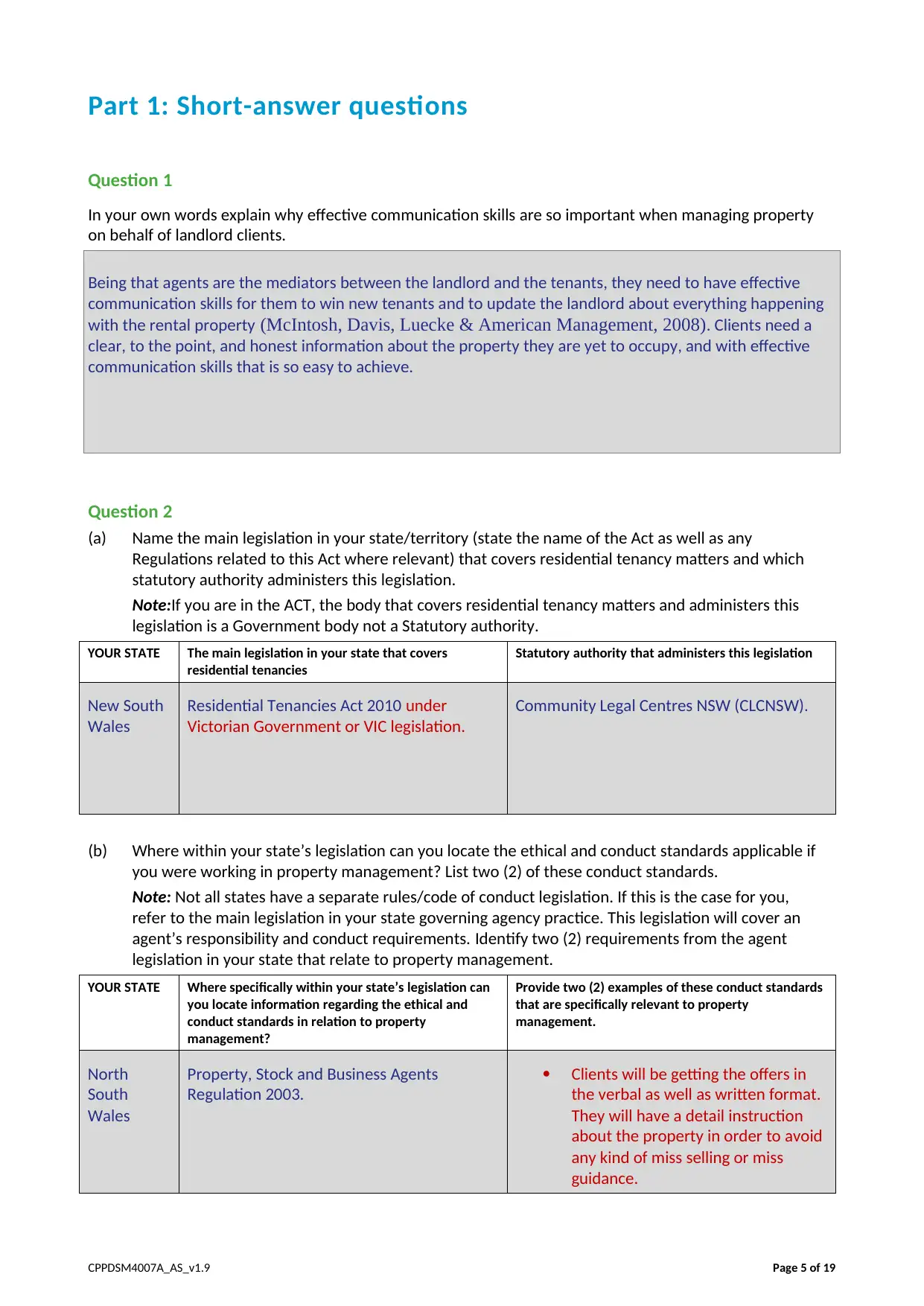
Part 1: Short-answer questions
Question 1
In your own words explain why effective communication skills are so important when managing property
on behalf of landlord clients.
Being that agents are the mediators between the landlord and the tenants, they need to have effective
communication skills for them to win new tenants and to update the landlord about everything happening
with the rental property (McIntosh, Davis, Luecke & American Management, 2008). Clients need a
clear, to the point, and honest information about the property they are yet to occupy, and with effective
communication skills that is so easy to achieve.
Question 2
(a) Name the main legislation in your state/territory (state the name of the Act as well as any
Regulations related to this Act where relevant) that covers residential tenancy matters and which
statutory authority administers this legislation.
Note:If you are in the ACT, the body that covers residential tenancy matters and administers this
legislation is a Government body not a Statutory authority.
YOUR STATE The main legislation in your state that covers
residential tenancies
Statutory authority that administers this legislation
New South
Wales
Residential Tenancies Act 2010 under
Victorian Government or VIC legislation.
Community Legal Centres NSW (CLCNSW).
(b) Where within your state’s legislation can you locate the ethical and conduct standards applicable if
you were working in property management? List two (2) of these conduct standards.
Note: Not all states have a separate rules/code of conduct legislation. If this is the case for you,
refer to the main legislation in your state governing agency practice. This legislation will cover an
agent’s responsibility and conduct requirements. Identify two (2) requirements from the agent
legislation in your state that relate to property management.
YOUR STATE Where specifically within your state’s legislation can
you locate information regarding the ethical and
conduct standards in relation to property
management?
Provide two (2) examples of these conduct standards
that are specifically relevant to property
management.
North
South
Wales
Property, Stock and Business Agents
Regulation 2003.
Clients will be getting the offers in
the verbal as well as written format.
They will have a detail instruction
about the property in order to avoid
any kind of miss selling or miss
guidance.
CPPDSM4007A_AS_v1.9 Page 5 of 19
Question 1
In your own words explain why effective communication skills are so important when managing property
on behalf of landlord clients.
Being that agents are the mediators between the landlord and the tenants, they need to have effective
communication skills for them to win new tenants and to update the landlord about everything happening
with the rental property (McIntosh, Davis, Luecke & American Management, 2008). Clients need a
clear, to the point, and honest information about the property they are yet to occupy, and with effective
communication skills that is so easy to achieve.
Question 2
(a) Name the main legislation in your state/territory (state the name of the Act as well as any
Regulations related to this Act where relevant) that covers residential tenancy matters and which
statutory authority administers this legislation.
Note:If you are in the ACT, the body that covers residential tenancy matters and administers this
legislation is a Government body not a Statutory authority.
YOUR STATE The main legislation in your state that covers
residential tenancies
Statutory authority that administers this legislation
New South
Wales
Residential Tenancies Act 2010 under
Victorian Government or VIC legislation.
Community Legal Centres NSW (CLCNSW).
(b) Where within your state’s legislation can you locate the ethical and conduct standards applicable if
you were working in property management? List two (2) of these conduct standards.
Note: Not all states have a separate rules/code of conduct legislation. If this is the case for you,
refer to the main legislation in your state governing agency practice. This legislation will cover an
agent’s responsibility and conduct requirements. Identify two (2) requirements from the agent
legislation in your state that relate to property management.
YOUR STATE Where specifically within your state’s legislation can
you locate information regarding the ethical and
conduct standards in relation to property
management?
Provide two (2) examples of these conduct standards
that are specifically relevant to property
management.
North
South
Wales
Property, Stock and Business Agents
Regulation 2003.
Clients will be getting the offers in
the verbal as well as written format.
They will have a detail instruction
about the property in order to avoid
any kind of miss selling or miss
guidance.
CPPDSM4007A_AS_v1.9 Page 5 of 19

There should be a prompt response
to all the requests of the tenants for
the purpose of maintenance and
repairs. Landlord should
immediately respond to the tenants
in this regard to avoid any kind of
issues as a result of
miscommunication.
CPPDSM4007A_AS_v1.9 Page 6 of 19
to all the requests of the tenants for
the purpose of maintenance and
repairs. Landlord should
immediately respond to the tenants
in this regard to avoid any kind of
issues as a result of
miscommunication.
CPPDSM4007A_AS_v1.9 Page 6 of 19
⊘ This is a preview!⊘
Do you want full access?
Subscribe today to unlock all pages.

Trusted by 1+ million students worldwide
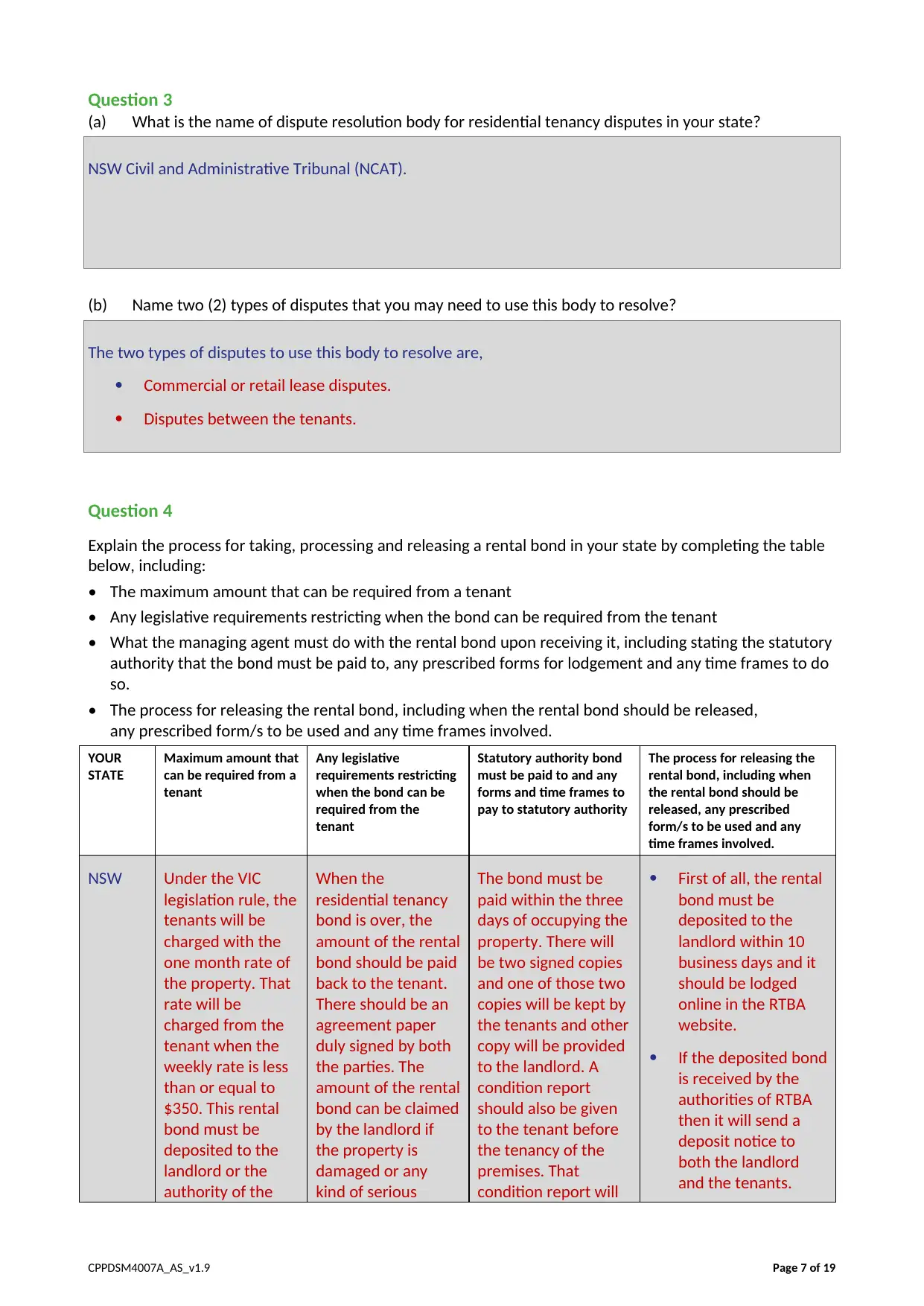
Question 3
(a) What is the name of dispute resolution body for residential tenancy disputes in your state?
NSW Civil and Administrative Tribunal (NCAT).
(b) Name two (2) types of disputes that you may need to use this body to resolve?
The two types of disputes to use this body to resolve are,
Commercial or retail lease disputes.
Disputes between the tenants.
Question 4
Explain the process for taking, processing and releasing a rental bond in your state by completing the table
below, including:
• The maximum amount that can be required from a tenant
• Any legislative requirements restricting when the bond can be required from the tenant
• What the managing agent must do with the rental bond upon receiving it, including stating the statutory
authority that the bond must be paid to, any prescribed forms for lodgement and any time frames to do
so.
• The process for releasing the rental bond, including when the rental bond should be released,
any prescribed form/s to be used and any time frames involved.
YOUR
STATE
Maximum amount that
can be required from a
tenant
Any legislative
requirements restricting
when the bond can be
required from the
tenant
Statutory authority bond
must be paid to and any
forms and time frames to
pay to statutory authority
The process for releasing the
rental bond, including when
the rental bond should be
released, any prescribed
form/s to be used and any
time frames involved.
NSW Under the VIC
legislation rule, the
tenants will be
charged with the
one month rate of
the property. That
rate will be
charged from the
tenant when the
weekly rate is less
than or equal to
$350. This rental
bond must be
deposited to the
landlord or the
authority of the
When the
residential tenancy
bond is over, the
amount of the rental
bond should be paid
back to the tenant.
There should be an
agreement paper
duly signed by both
the parties. The
amount of the rental
bond can be claimed
by the landlord if
the property is
damaged or any
kind of serious
The bond must be
paid within the three
days of occupying the
property. There will
be two signed copies
and one of those two
copies will be kept by
the tenants and other
copy will be provided
to the landlord. A
condition report
should also be given
to the tenant before
the tenancy of the
premises. That
condition report will
First of all, the rental
bond must be
deposited to the
landlord within 10
business days and it
should be lodged
online in the RTBA
website.
If the deposited bond
is received by the
authorities of RTBA
then it will send a
deposit notice to
both the landlord
and the tenants.
CPPDSM4007A_AS_v1.9 Page 7 of 19
(a) What is the name of dispute resolution body for residential tenancy disputes in your state?
NSW Civil and Administrative Tribunal (NCAT).
(b) Name two (2) types of disputes that you may need to use this body to resolve?
The two types of disputes to use this body to resolve are,
Commercial or retail lease disputes.
Disputes between the tenants.
Question 4
Explain the process for taking, processing and releasing a rental bond in your state by completing the table
below, including:
• The maximum amount that can be required from a tenant
• Any legislative requirements restricting when the bond can be required from the tenant
• What the managing agent must do with the rental bond upon receiving it, including stating the statutory
authority that the bond must be paid to, any prescribed forms for lodgement and any time frames to do
so.
• The process for releasing the rental bond, including when the rental bond should be released,
any prescribed form/s to be used and any time frames involved.
YOUR
STATE
Maximum amount that
can be required from a
tenant
Any legislative
requirements restricting
when the bond can be
required from the
tenant
Statutory authority bond
must be paid to and any
forms and time frames to
pay to statutory authority
The process for releasing the
rental bond, including when
the rental bond should be
released, any prescribed
form/s to be used and any
time frames involved.
NSW Under the VIC
legislation rule, the
tenants will be
charged with the
one month rate of
the property. That
rate will be
charged from the
tenant when the
weekly rate is less
than or equal to
$350. This rental
bond must be
deposited to the
landlord or the
authority of the
When the
residential tenancy
bond is over, the
amount of the rental
bond should be paid
back to the tenant.
There should be an
agreement paper
duly signed by both
the parties. The
amount of the rental
bond can be claimed
by the landlord if
the property is
damaged or any
kind of serious
The bond must be
paid within the three
days of occupying the
property. There will
be two signed copies
and one of those two
copies will be kept by
the tenants and other
copy will be provided
to the landlord. A
condition report
should also be given
to the tenant before
the tenancy of the
premises. That
condition report will
First of all, the rental
bond must be
deposited to the
landlord within 10
business days and it
should be lodged
online in the RTBA
website.
If the deposited bond
is received by the
authorities of RTBA
then it will send a
deposit notice to
both the landlord
and the tenants.
CPPDSM4007A_AS_v1.9 Page 7 of 19
Paraphrase This Document
Need a fresh take? Get an instant paraphrase of this document with our AI Paraphraser

YOUR
STATE
Maximum amount that
can be required from a
tenant
Any legislative
requirements restricting
when the bond can be
required from the
tenant
Statutory authority bond
must be paid to and any
forms and time frames to
pay to statutory authority
The process for releasing the
rental bond, including when
the rental bond should be
released, any prescribed
form/s to be used and any
time frames involved.
residential
property. The
rental bond is
generally paid
within the 10
business days.
losses is caused by
the tenants. A
cleaning cost is also
reduced form the
rental bond of the
property.
be returned back to
the landlord on the
next day, after signing
it properly.
The rental bond is
released after the
completion of the
period of occupying
the premises by the
tenants. It is released
after a detailed check
up if the property
has been damaged
or not. After
transferring bond, a
receipt should be
hand over to the
tenant for the future
security.
CPPDSM4007A_AS_v1.9 Page 8 of 19
STATE
Maximum amount that
can be required from a
tenant
Any legislative
requirements restricting
when the bond can be
required from the
tenant
Statutory authority bond
must be paid to and any
forms and time frames to
pay to statutory authority
The process for releasing the
rental bond, including when
the rental bond should be
released, any prescribed
form/s to be used and any
time frames involved.
residential
property. The
rental bond is
generally paid
within the 10
business days.
losses is caused by
the tenants. A
cleaning cost is also
reduced form the
rental bond of the
property.
be returned back to
the landlord on the
next day, after signing
it properly.
The rental bond is
released after the
completion of the
period of occupying
the premises by the
tenants. It is released
after a detailed check
up if the property
has been damaged
or not. After
transferring bond, a
receipt should be
hand over to the
tenant for the future
security.
CPPDSM4007A_AS_v1.9 Page 8 of 19
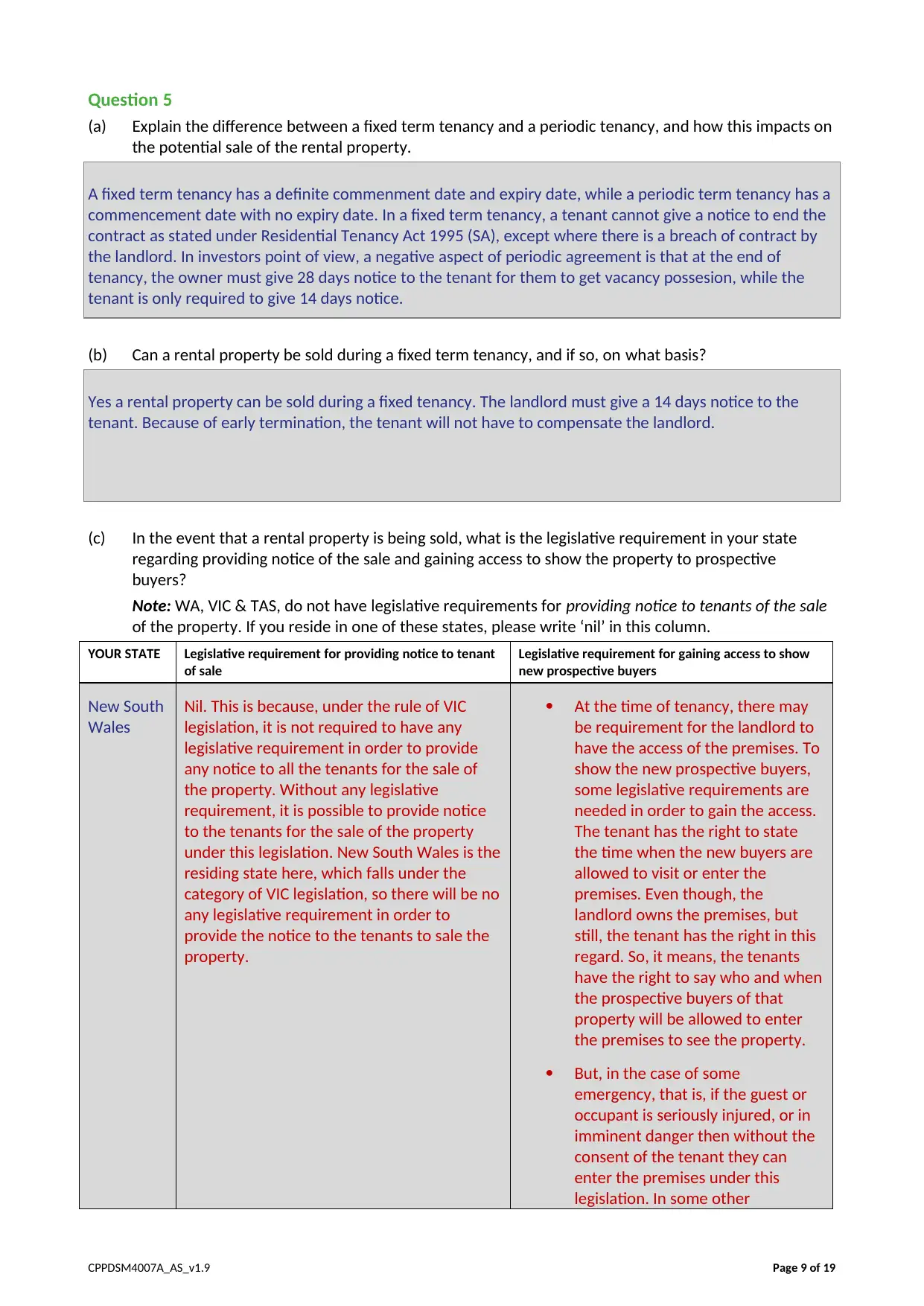
Question 5
(a) Explain the difference between a fixed term tenancy and a periodic tenancy, and how this impacts on
the potential sale of the rental property.
A fixed term tenancy has a definite commenment date and expiry date, while a periodic term tenancy has a
commencement date with no expiry date. In a fixed term tenancy, a tenant cannot give a notice to end the
contract as stated under Residential Tenancy Act 1995 (SA), except where there is a breach of contract by
the landlord. In investors point of view, a negative aspect of periodic agreement is that at the end of
tenancy, the owner must give 28 days notice to the tenant for them to get vacancy possesion, while the
tenant is only required to give 14 days notice.
(b) Can a rental property be sold during a fixed term tenancy, and if so, on what basis?
Yes a rental property can be sold during a fixed tenancy. The landlord must give a 14 days notice to the
tenant. Because of early termination, the tenant will not have to compensate the landlord.
(c) In the event that a rental property is being sold, what is the legislative requirement in your state
regarding providing notice of the sale and gaining access to show the property to prospective
buyers?
Note: WA, VIC & TAS, do not have legislative requirements for providing notice to tenants of the sale
of the property. If you reside in one of these states, please write ‘nil’ in this column.
YOUR STATE Legislative requirement for providing notice to tenant
of sale
Legislative requirement for gaining access to show
new prospective buyers
New South
Wales
Nil. This is because, under the rule of VIC
legislation, it is not required to have any
legislative requirement in order to provide
any notice to all the tenants for the sale of
the property. Without any legislative
requirement, it is possible to provide notice
to the tenants for the sale of the property
under this legislation. New South Wales is the
residing state here, which falls under the
category of VIC legislation, so there will be no
any legislative requirement in order to
provide the notice to the tenants to sale the
property.
At the time of tenancy, there may
be requirement for the landlord to
have the access of the premises. To
show the new prospective buyers,
some legislative requirements are
needed in order to gain the access.
The tenant has the right to state
the time when the new buyers are
allowed to visit or enter the
premises. Even though, the
landlord owns the premises, but
still, the tenant has the right in this
regard. So, it means, the tenants
have the right to say who and when
the prospective buyers of that
property will be allowed to enter
the premises to see the property.
But, in the case of some
emergency, that is, if the guest or
occupant is seriously injured, or in
imminent danger then without the
consent of the tenant they can
enter the premises under this
legislation. In some other
CPPDSM4007A_AS_v1.9 Page 9 of 19
(a) Explain the difference between a fixed term tenancy and a periodic tenancy, and how this impacts on
the potential sale of the rental property.
A fixed term tenancy has a definite commenment date and expiry date, while a periodic term tenancy has a
commencement date with no expiry date. In a fixed term tenancy, a tenant cannot give a notice to end the
contract as stated under Residential Tenancy Act 1995 (SA), except where there is a breach of contract by
the landlord. In investors point of view, a negative aspect of periodic agreement is that at the end of
tenancy, the owner must give 28 days notice to the tenant for them to get vacancy possesion, while the
tenant is only required to give 14 days notice.
(b) Can a rental property be sold during a fixed term tenancy, and if so, on what basis?
Yes a rental property can be sold during a fixed tenancy. The landlord must give a 14 days notice to the
tenant. Because of early termination, the tenant will not have to compensate the landlord.
(c) In the event that a rental property is being sold, what is the legislative requirement in your state
regarding providing notice of the sale and gaining access to show the property to prospective
buyers?
Note: WA, VIC & TAS, do not have legislative requirements for providing notice to tenants of the sale
of the property. If you reside in one of these states, please write ‘nil’ in this column.
YOUR STATE Legislative requirement for providing notice to tenant
of sale
Legislative requirement for gaining access to show
new prospective buyers
New South
Wales
Nil. This is because, under the rule of VIC
legislation, it is not required to have any
legislative requirement in order to provide
any notice to all the tenants for the sale of
the property. Without any legislative
requirement, it is possible to provide notice
to the tenants for the sale of the property
under this legislation. New South Wales is the
residing state here, which falls under the
category of VIC legislation, so there will be no
any legislative requirement in order to
provide the notice to the tenants to sale the
property.
At the time of tenancy, there may
be requirement for the landlord to
have the access of the premises. To
show the new prospective buyers,
some legislative requirements are
needed in order to gain the access.
The tenant has the right to state
the time when the new buyers are
allowed to visit or enter the
premises. Even though, the
landlord owns the premises, but
still, the tenant has the right in this
regard. So, it means, the tenants
have the right to say who and when
the prospective buyers of that
property will be allowed to enter
the premises to see the property.
But, in the case of some
emergency, that is, if the guest or
occupant is seriously injured, or in
imminent danger then without the
consent of the tenant they can
enter the premises under this
legislation. In some other
CPPDSM4007A_AS_v1.9 Page 9 of 19
⊘ This is a preview!⊘
Do you want full access?
Subscribe today to unlock all pages.

Trusted by 1+ million students worldwide

YOUR STATE Legislative requirement for providing notice to tenant
of sale
Legislative requirement for gaining access to show
new prospective buyers
circumstances, a notice before 24
hours should be issued to the
tenants to have their consent to
give access to enter the premises.
CPPDSM4007A_AS_v1.9 Page 10 of 19
of sale
Legislative requirement for gaining access to show
new prospective buyers
circumstances, a notice before 24
hours should be issued to the
tenants to have their consent to
give access to enter the premises.
CPPDSM4007A_AS_v1.9 Page 10 of 19
Paraphrase This Document
Need a fresh take? Get an instant paraphrase of this document with our AI Paraphraser
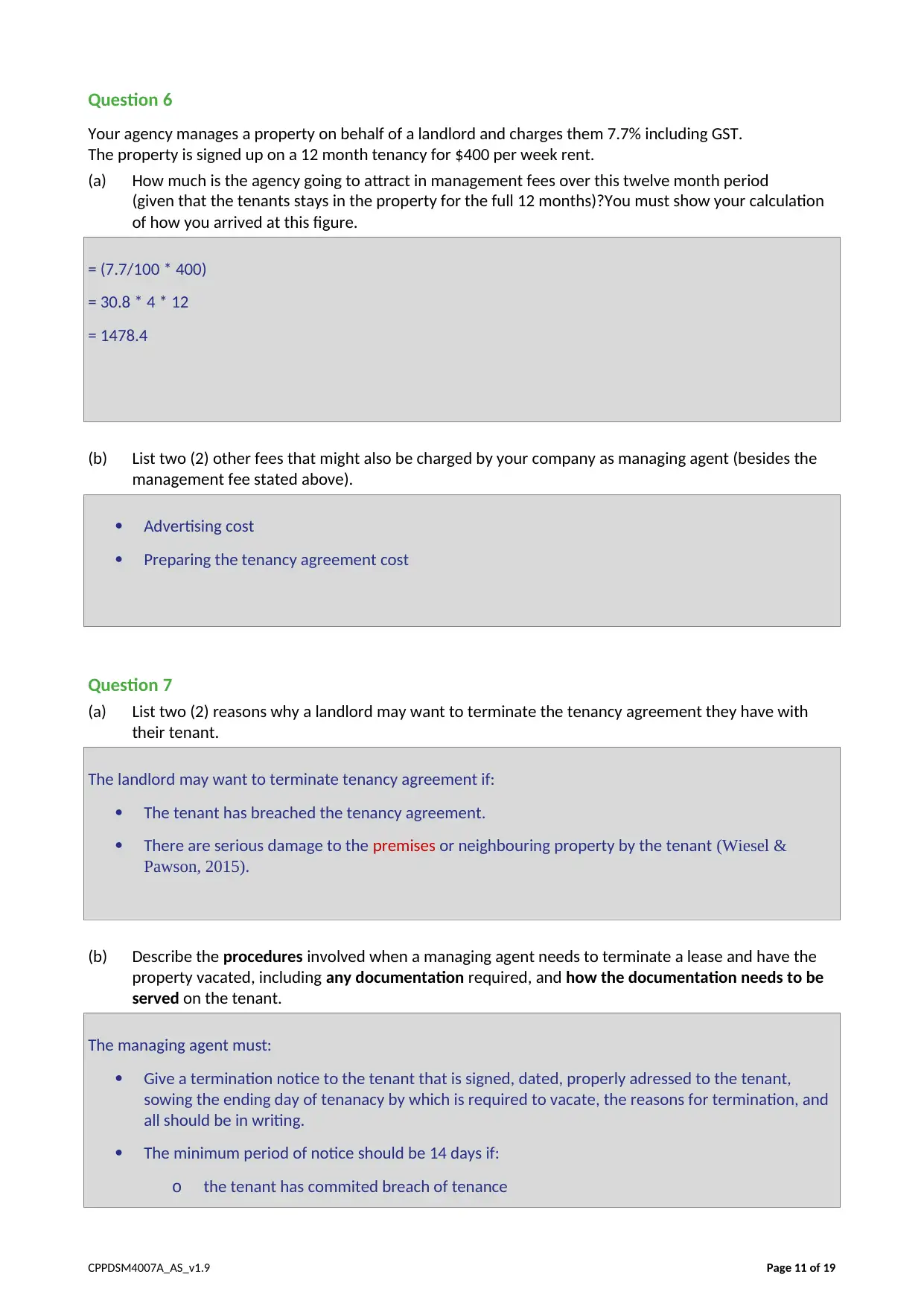
Question 6
Your agency manages a property on behalf of a landlord and charges them 7.7% including GST.
The property is signed up on a 12 month tenancy for $400 per week rent.
(a) How much is the agency going to attract in management fees over this twelve month period
(given that the tenants stays in the property for the full 12 months)?You must show your calculation
of how you arrived at this figure.
= (7.7/100 * 400)
= 30.8 * 4 * 12
= 1478.4
(b) List two (2) other fees that might also be charged by your company as managing agent (besides the
management fee stated above).
Advertising cost
Preparing the tenancy agreement cost
Question 7
(a) List two (2) reasons why a landlord may want to terminate the tenancy agreement they have with
their tenant.
The landlord may want to terminate tenancy agreement if:
The tenant has breached the tenancy agreement.
There are serious damage to the premises or neighbouring property by the tenant (Wiesel &
Pawson, 2015).
(b) Describe the procedures involved when a managing agent needs to terminate a lease and have the
property vacated, including any documentation required, and how the documentation needs to be
served on the tenant.
The managing agent must:
Give a termination notice to the tenant that is signed, dated, properly adressed to the tenant,
sowing the ending day of tenanacy by which is required to vacate, the reasons for termination, and
all should be in writing.
The minimum period of notice should be 14 days if:
o the tenant has commited breach of tenance
CPPDSM4007A_AS_v1.9 Page 11 of 19
Your agency manages a property on behalf of a landlord and charges them 7.7% including GST.
The property is signed up on a 12 month tenancy for $400 per week rent.
(a) How much is the agency going to attract in management fees over this twelve month period
(given that the tenants stays in the property for the full 12 months)?You must show your calculation
of how you arrived at this figure.
= (7.7/100 * 400)
= 30.8 * 4 * 12
= 1478.4
(b) List two (2) other fees that might also be charged by your company as managing agent (besides the
management fee stated above).
Advertising cost
Preparing the tenancy agreement cost
Question 7
(a) List two (2) reasons why a landlord may want to terminate the tenancy agreement they have with
their tenant.
The landlord may want to terminate tenancy agreement if:
The tenant has breached the tenancy agreement.
There are serious damage to the premises or neighbouring property by the tenant (Wiesel &
Pawson, 2015).
(b) Describe the procedures involved when a managing agent needs to terminate a lease and have the
property vacated, including any documentation required, and how the documentation needs to be
served on the tenant.
The managing agent must:
Give a termination notice to the tenant that is signed, dated, properly adressed to the tenant,
sowing the ending day of tenanacy by which is required to vacate, the reasons for termination, and
all should be in writing.
The minimum period of notice should be 14 days if:
o the tenant has commited breach of tenance
CPPDSM4007A_AS_v1.9 Page 11 of 19
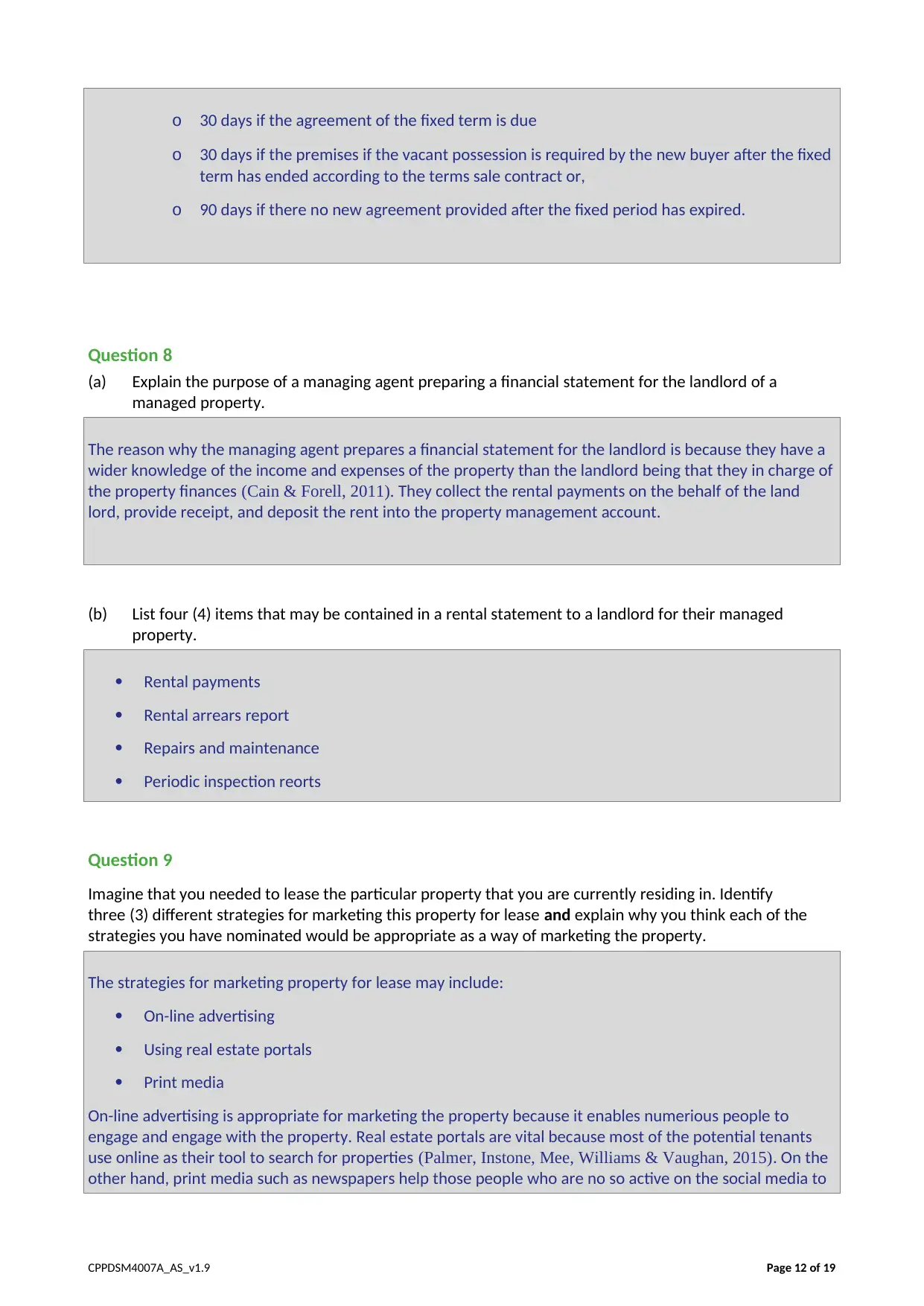
o 30 days if the agreement of the fixed term is due
o 30 days if the premises if the vacant possession is required by the new buyer after the fixed
term has ended according to the terms sale contract or,
o 90 days if there no new agreement provided after the fixed period has expired.
Question 8
(a) Explain the purpose of a managing agent preparing a financial statement for the landlord of a
managed property.
The reason why the managing agent prepares a financial statement for the landlord is because they have a
wider knowledge of the income and expenses of the property than the landlord being that they in charge of
the property finances (Cain & Forell, 2011). They collect the rental payments on the behalf of the land
lord, provide receipt, and deposit the rent into the property management account.
(b) List four (4) items that may be contained in a rental statement to a landlord for their managed
property.
Rental payments
Rental arrears report
Repairs and maintenance
Periodic inspection reorts
Question 9
Imagine that you needed to lease the particular property that you are currently residing in. Identify
three (3) different strategies for marketing this property for lease and explain why you think each of the
strategies you have nominated would be appropriate as a way of marketing the property.
The strategies for marketing property for lease may include:
On-line advertising
Using real estate portals
Print media
On-line advertising is appropriate for marketing the property because it enables numerious people to
engage and engage with the property. Real estate portals are vital because most of the potential tenants
use online as their tool to search for properties (Palmer, Instone, Mee, Williams & Vaughan, 2015). On the
other hand, print media such as newspapers help those people who are no so active on the social media to
CPPDSM4007A_AS_v1.9 Page 12 of 19
o 30 days if the premises if the vacant possession is required by the new buyer after the fixed
term has ended according to the terms sale contract or,
o 90 days if there no new agreement provided after the fixed period has expired.
Question 8
(a) Explain the purpose of a managing agent preparing a financial statement for the landlord of a
managed property.
The reason why the managing agent prepares a financial statement for the landlord is because they have a
wider knowledge of the income and expenses of the property than the landlord being that they in charge of
the property finances (Cain & Forell, 2011). They collect the rental payments on the behalf of the land
lord, provide receipt, and deposit the rent into the property management account.
(b) List four (4) items that may be contained in a rental statement to a landlord for their managed
property.
Rental payments
Rental arrears report
Repairs and maintenance
Periodic inspection reorts
Question 9
Imagine that you needed to lease the particular property that you are currently residing in. Identify
three (3) different strategies for marketing this property for lease and explain why you think each of the
strategies you have nominated would be appropriate as a way of marketing the property.
The strategies for marketing property for lease may include:
On-line advertising
Using real estate portals
Print media
On-line advertising is appropriate for marketing the property because it enables numerious people to
engage and engage with the property. Real estate portals are vital because most of the potential tenants
use online as their tool to search for properties (Palmer, Instone, Mee, Williams & Vaughan, 2015). On the
other hand, print media such as newspapers help those people who are no so active on the social media to
CPPDSM4007A_AS_v1.9 Page 12 of 19
⊘ This is a preview!⊘
Do you want full access?
Subscribe today to unlock all pages.

Trusted by 1+ million students worldwide
1 out of 19
Related Documents
Your All-in-One AI-Powered Toolkit for Academic Success.
+13062052269
info@desklib.com
Available 24*7 on WhatsApp / Email
![[object Object]](/_next/static/media/star-bottom.7253800d.svg)
Unlock your academic potential
Copyright © 2020–2025 A2Z Services. All Rights Reserved. Developed and managed by ZUCOL.





